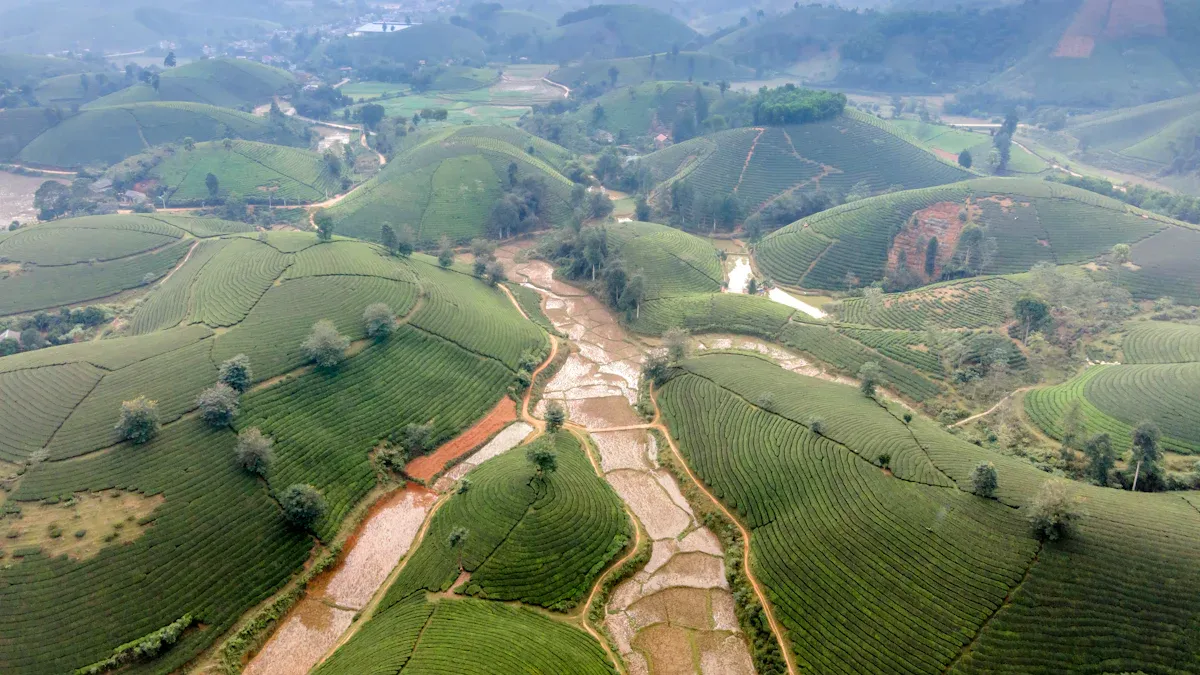Your Guide to Tea Tasting and a Pu'er Workshop in Yunnan
A tea tasting and pu’er workshop in yunnan is a hands-on experience. You learn directly from a tea master. These unique workshops empower you with new skills.
You will practice the art of tea tasting, master traditional brewing, and even press your own tea cake. This is more than a class. It is a cultural journey connecting you to the origin of the tea in your cup. These tea tasting workshops are truly special.
Key Takeaways
A Pu'er tea workshop in Yunnan teaches you how to taste and brew tea.
You will learn to make your own tea cake and design its wrapper.
A tea master will guide you through the traditional Gong Fu brewing method.
You can buy good Pu'er tea in Yunnan after your workshop.
Proper storage helps your Pu'er tea age well at home.
PREPARING FOR YOUR YUNNAN TRIP

Your journey into the world of Pu'er tea begins before you even arrive in Yunnan. Proper planning helps you find the best experiences. This preparation ensures your trip is smooth and deeply rewarding.
FINDING THE RIGHT WORKSHOP
You can start by researching options online. Look for workshops in key tea regions like Xishuangbanna or the capital city, Kunming. These areas are famous for their rich tea culture. Reading reviews will help you find high-quality workshops that match your interests.
BOOKING WITH A TRUSTED GUIDE
Navigating a new country can be challenging. A specialized agency removes this stress. China Explorer Tour arranges private, high-quality workshops for you. We handle all the logistics. This allows you to focus on the experience. You can explore our tailor-made tour solutions to create your perfect trip.
JOIN A CURATED CULINARY TOUR
You might prefer an all-in-one package. Our 8-Day Yunnan Culinary & Cultural Adventure seamlessly includes these cultural moments. Travelers love the authentic food experiences and expert guides. This tour offers a great blend of culture, food, and one of the famous teas of China. It is a fantastic way to experience a tea tasting and pu’er workshop in yunnan.
PU'ER TEA BASICS TO KNOW
Knowing some basics will enhance your visit. Pu-er tea comes in two main types.
Sheng (Raw) Pu'er: This tea ages naturally over many years.
Shou (Ripe) Pu'er: This tea goes through a "wet piling" process to speed up fermentation.
You will also hear a few key terms. Gushu refers to tea from ancient trees, often over 100 years old. A bingcha is a traditional tea cake, which historically weighed 357 grams. Understanding these terms will deepen your appreciation for these specialty origin teas.
YOUR TEA TASTING AND PU’ER WORKSHOP IN YUNNAN
You have arrived in Yunnan. Now the real adventure begins. A tea tasting and pu’er workshop in yunnan is a step-by-step journey. You will transform your understanding of tea from a simple drink into a rich sensory art. These workshops offer a complete immersion into the world of Pu'er.
MEETING THE TEA MASTER
Your experience starts when you meet your tea master. This person is your guide into the world of Pu'er. A recognized tea master in China achieves this status through rigorous training and examination. You can feel confident in their deep knowledge. Their qualifications often include:
Education: They complete specific courses in tea art and culture.
Experience: They have years of hands-on practice in tea preparation.
Endorsement: They earn recommendations from respected industry professionals.
The master will share stories and insights. This connection elevates your journey and deepens your tea appreciation.
THE ART OF GONG FU BREWING
Next, you will learn the elegant practice of Gong Fu brewing. This traditional method uses specific tools to control the brewing process precisely. Your master will introduce you to the essential teaware.
Gaiwan: A lidded bowl for steeping the tea leaves.
Cha Hai (Fairness Pitcher): A pitcher to ensure every cup has the same strength and taste.
Tea Cups: Small cups designed for sipping and savoring the tea.
Cha Ban (Tea Tray): A tray to catch any spilled water.
Cha Dao (Tea Tools): A set including a scoop, tweezers, and a tea knife to break apart compressed tea cakes.
You will learn how water temperature and steeping time affect the final taste. The master will guide you through rinsing the leaves and performing multiple short infusions. Each infusion reveals a new layer of aroma and flavor.
Pu'er Type | Water Temperature | Steeping Time (Gong Fu) |
|---|---|---|
Young Raw Pu'er | Rinse, then 5-10 seconds, adding 5-10 seconds each steep. | |
Ripe Pu'er | 95-100°C (Boiling) | Rinse, then 5-10 seconds, adding 5-10 seconds each steep. |
THE GUIDED TASTING
This is the heart of all tea tasting workshops. You will engage all your senses. The master will teach you to first observe the dry leaves and their unique aroma. Then, you will examine the color of the brewed tea. You will learn to slurp the tea. This action aerates the liquid and spreads it across your palate. It helps you identify the full range of flavors and the complex aroma.
You will discover concepts like Hui Gan, a pleasant, returning sweetness that lingers in your throat. You will also learn to describe the tea's mouthfeel. This is the texture and weight of the tea in your mouth.
A tea can feel round, soft, or thick.
Younger teas might have a "nice bite" or sharpness that mellows with age.
This guided tasting helps you understand the character of different specialty origin teas. You will notice how the aroma and taste evolve with each infusion.
PRESSING YOUR OWN TEA CAKE
Now you get to be hands-on. You will press your very own Pu'er tea cake, or bingcha. The master will show you how to weigh the loose-leaf tea. You will then steam the leaves to soften them. Next, you place the softened leaves into a cloth bag. You twist the bag tightly to form a disc shape. Finally, you place the disc under a traditional stone press. This step compacts the tea into its final cake form. This part of the tea tasting and pu’er workshop in yunnan creates a lasting souvenir.
DESIGNING YOUR WRAPPER
The final step is personalizing your creation. You will design a wrapper for your freshly pressed tea cake. Traditionally, a stack of Pu'er cakes is called a tong. These stacks were historically wrapped for transport and storage.
A tong often consists of five to seven tea cakes.
The entire stack is typically wrapped in bamboo leaves.
Your individual cake wrapper is your personal mark. You can draw a design or write a message on the paper. This wrapper protects your tea and serves as a beautiful reminder of your unique experience in Yunnan.
BRINGING THE YUNNAN EXPERIENCE HOME
Your workshop is complete, but your tea journey has just begun. You can apply your new knowledge at home. This section gives you practical advice for buying, brewing, and storing Pu'er tea. You will continue to enjoy the rich culture of Yunnan long after your trip.
HOW TO BUY PU'ER IN YUNNAN
You can confidently navigate the tea markets in China with your new skills. When assessing quality, trust your senses. A high-quality tea will have a distinct aroma.
Aged and Woody Aroma: This indicates a well-matured tea.
Floral and Fruity Aroma: This suggests a vibrant, younger tea.
A pleasant aroma is a good sign. A musty or sour aroma is a warning. Pricing for these specialty origin teas varies greatly. Factors like age, origin mountain, and tree type (Gushu) increase the cost. The market for rare tea is competitive. You will see a wide range of prices.
Tea Type | Year | Origin | Price (Approx.) |
|---|---|---|---|
Yiwu Gushu Sheng Pu'er | 2022 | Yiwu | $100 / 200g |
Gedeng Arbor Pu-erh | 2023 | Gedeng | $83 / 357g |
CONTINUING YOUR PRACTICE AT HOME
You can recreate the Gong Fu experience anywhere. You only need a few essential tools like a gaiwan, a fairness pitcher, and small cups. Creating a tasting journal helps you track your progress. It deepens your understanding of each tea's unique taste and aroma.
Use a simple table to record your notes. This practice helps you remember the unique character of each tea you try.
Tea Name | Aroma Notes | Flavor Notes | Mouthfeel |
|---|---|---|---|
2023 Gedeng Arbor | Floral, sweet | Fruity, mineral | Round, soft |
STORING YOUR PU'ER CAKES
Proper storage is crucial for aging your Pu'er tea. You must control the environment to protect your investment. Many tea enthusiasts aim for specific conditions.
Temperature: Keep your tea between 20-30°C (70-85°F).
Humidity: A range of 60-80% is ideal. Below 60%, the tea ages too slowly.
Avoid common mistakes. Do not store your tea near strong smells like spices or coffee, as the leaves will absorb the aroma. Keep cakes away from direct sunlight and avoid sudden temperature changes that cause condensation. High humidity above 73% greatly increases the risk of mold.
A tea tasting and pu’er workshop in yunnan transforms your understanding of tea. The simple beverage becomes a rich, sensory art form. You learn practical skills like Gong Fu brewing and identifying Hui Gan. These tools will enhance your tea enjoyment for a lifetime.
These workshops mark the true beginning of your personal Pu'er journey. Let a trusted partner like China Explorer Tour guide your first steps into this amazing world. 🗺️
FAQ
When is the best time to visit Yunnan for a tea workshop?
You should plan your trip for the spring harvest. This period from March to May offers the best weather. You will also get to experience the freshest teas of the year. The vibrant green tea fields create a beautiful backdrop for your journey. 🍵
Do I need to speak Chinese for the workshop?
You do not need to speak Chinese. When you book with a trusted guide like China Explorer Tour, we provide an expert English-speaking guide. Your guide translates everything for you. This ensures you have a smooth and immersive experience without any language barriers.
What should I bring to a Pu'er workshop?
You can bring a few simple items to enhance your experience.
A notebook and pen for taking notes.
A camera to capture the beautiful moments.
Comfortable clothing and shoes for the day.
Your workshop will provide all the necessary tea and equipment.
Can I bring my own tea cake home?
Yes, you can bring your personally pressed tea cake home. It is a wonderful souvenir of your trip.
Remember to check your home country's customs regulations for bringing back agricultural products. This simple step ensures a hassle-free return.
See Also
Discovering Chengdu's Authentic Teahouses: A People's Park Area Exploration Guide
Exploring Chengdu's Wenshu Monastery: An Essential Traveler's Visit Handbook
Chongqing Zoo Adventure: Your Complete Guide to Seeing Pandas
Unveiling Beijing's Ming Tombs: A Comprehensive Visitor's Exploration Guide
Why Chengdu's Mapo Tofu Cooking Class Captivates Every Heart
